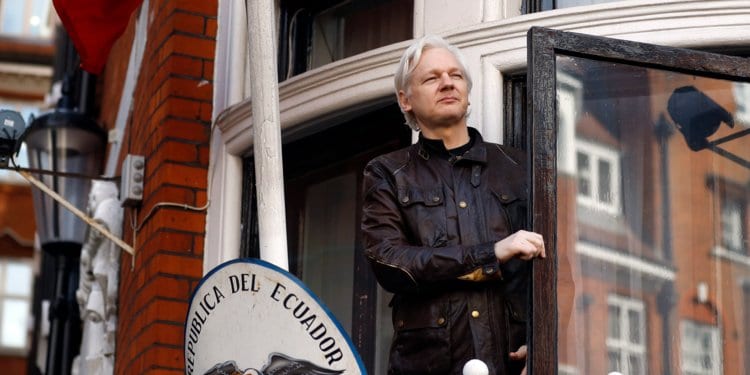LONDON – Nearly a six-year-long refuge of Julian Assange, founder of controversial Wikileaks, at the Ecuadorian embassy in London is in danger, triggering the possibility of his arrest by British authorities and extradition to the US.
According to CNN, his current situation is “unusually bad” and that he could leave the embassy “any day now”. Either Assange will be pushed to vacate the place or his life made harder enough in the embassy that he will prefer to leave on his own. The media outlet citing sources claimed that his position there is “in jeopardy”.
Assange, who had been wanted to Sweden in a sex-related case and still wanted to the US on espionage charges, has been living at the embassy since June 2012 and he has been detained in a small room without charge for 2,726 days. For 59 days, he has been denied visitors and outside communications since the Ecuadorian government cut off his access on March 28.
However, the sex-assault case has been dropped by the Swedish prosecution in May 2017, but Assange feared that he will be arrested after leaving the embassy for breaching bail conditions.
The WikiLeaks founder had surrendered himself to UK police in December 2010, and was released on bail after being held for ten days. Having been unsuccessful in his challenge to the extradition proceedings, he breached his bail and absconded.
In Jan 2018, the Ecuador government granted him a status of citizen and requested the UK to recognise Assange as a diplomatic agent.
https://en.dailypakistan.com.pk/world/wikileaks-julian-assange-gets-citizenship-of-ecuador/
Currently, his lawyers are only allowed to visit Assange in the embassy where their mobile phones are jammed during the meeting.
The sources further revealed that Ecuador’s newly elected president, Lenín Moreno, is facing immense pressure from the US to expel Assange. Moreno, in an interview earlier this year, described Assange as an “inherited problem” and “more than a nuisance”.
Expelling Assange from the embassy could open the Wikileaks founder to arrest in Britain and potential extradition to the US, which has prepared a charge sheet against him. The US intel agencies claim that Russia used him as an intermediary to distribute supposedly hacked emails from Hillary Clinton’s campaign during the 2016 presidential election.
British authorities have already said that they would issue a warrant for Assange on jumping the bail. However, the fate of Assage would be more uncertain.
“The concern from day one until the present is that if Julian Assange walks out of the Embassy, he will be extradited to face what the executive director of the ACLU described as an ‘unprecedented and unconstitutional’ prosecution under the US Espionage Act,” his lawyer Melinda Taylor told CNN.
Section 794 of that Act, covering supplying information to a wartime enemy, carries the death penalty. Last year, CIA director Mike Pompeo, now the US secretary of state, labelled WikiLeaks as a “hostile non-state intelligence service.” Pompeo declared: “To give them the space to crush us with misappropriated secrets is a perversion of what our great Constitution stands for. It ends now.”
“For the last eight years, the UK has refused to either confirm or deny that they have received an extradition request from the US. At the same time, they have refused to provide assurances that Julian will not be extradited to the US if such a request were to be received, and maintained an ever-present vigil of the Embassy, notwithstanding a UN directive to take steps to ensure Julian’s immediate liberty,” Taylor told CNN.
“Their silence speaks volumes, particularly in light of recent statements from US officials that Julian’s arrest and extradition are a priority.”
Recently, the government of Ecuador had blocked internet access to WikiLeaks founder Julian Assange at the nation’s London embassy over the recent social media activity of global whistleblower.
https://en.dailypakistan.com.pk/world/julian-assanges-internet-access-blocked-at-ecuadorian-embassy-after-commentary-on-russia-britain-spy-spat/
In a statement released on Wednesday, officials said Assange’s recent posts ‘put at risk’ the good relations Ecuador maintains with nations throughout Europe claiming that it had acted because Assange had breached “a written commitment made to the government at the end of 2017 not to issue messages that might interfere with other states”.














